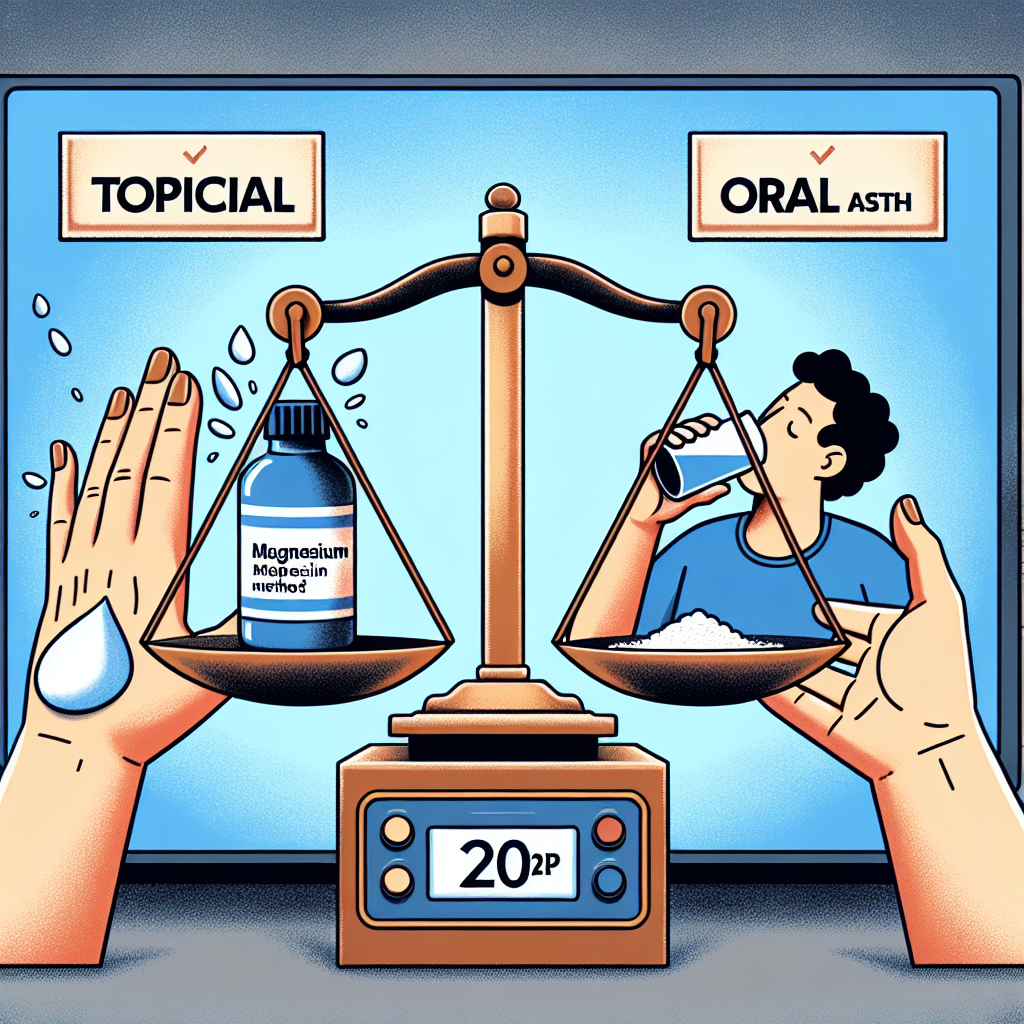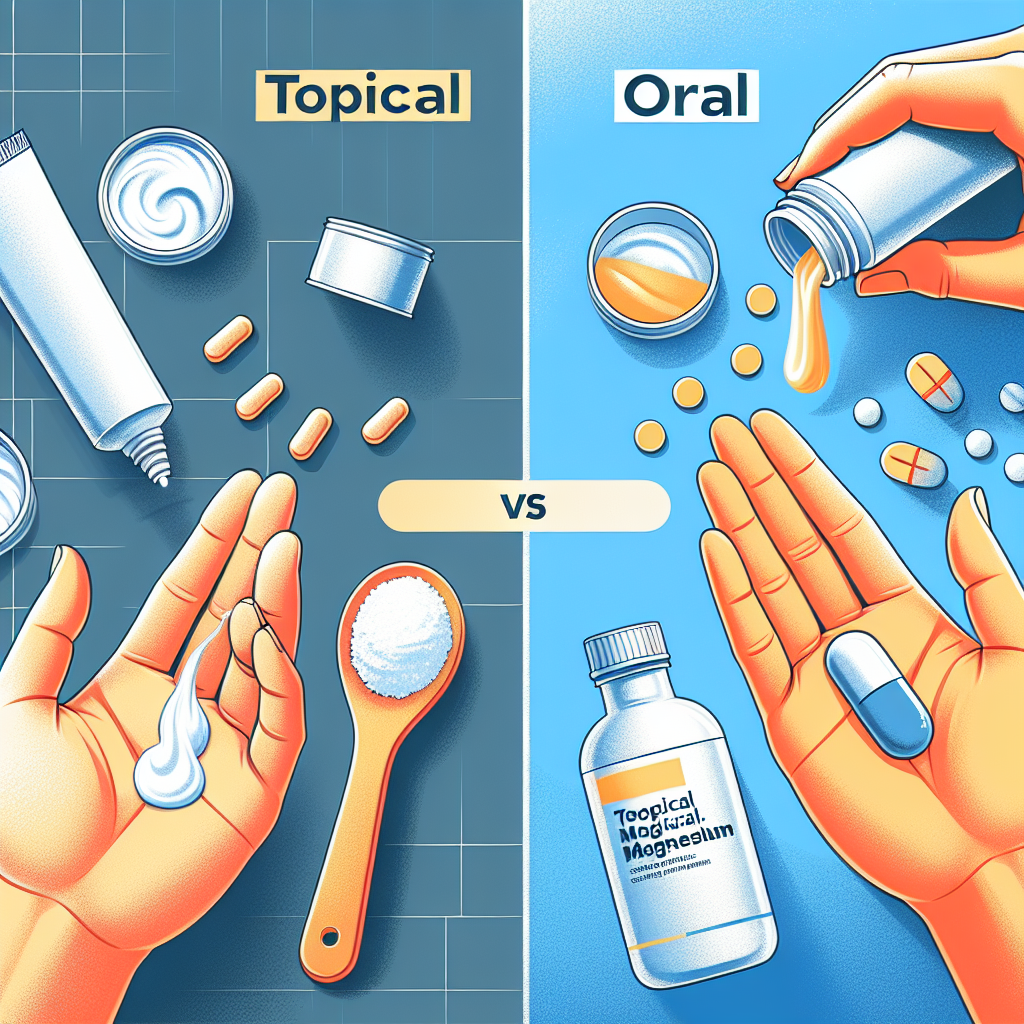Topical Magnesium vs Oral: Which Is More Effective?

Discover the effectiveness of Topical Magnesium versus Oral intake. Uncover the best method for your health needs. Visit My Vibrant Vitality to learn more.
Comparing Topical Magnesium and Oral Supplements: Which is More Effective?
Magnesium, an essential mineral, plays a crucial role in over 300 biochemical reactions in the human body. It contributes to bone health, aids in nerve and muscle function, and even helps maintain a steady heartbeat. Despite its importance, many people do not get enough magnesium in their diet, leading to a deficiency. To combat this, magnesium supplements are available in two primary forms: oral and topical. But which is more effective? Let’s delve into the comparison between topical magnesium and oral supplements.
Oral magnesium supplements are the most common form of supplementation. They are available in various forms, including magnesium citrate, magnesium oxide, and magnesium glycinate, among others. These supplements are ingested and absorbed through the digestive system. They are easy to use, widely available, and relatively inexpensive. However, oral magnesium supplements have a few drawbacks. For one, they can cause gastrointestinal side effects, such as diarrhea and stomach cramps, especially when taken in high doses. Moreover, the absorption rate of oral magnesium supplements can vary greatly among individuals due to factors like age, health status, and the presence of other nutrients in the gut.
On the other hand, topical magnesium, often referred to as transdermal magnesium, is applied directly to the skin. It is typically available in forms like oils, lotions, sprays, and bath salts. The idea behind topical magnesium is that it bypasses the digestive system and is absorbed directly into the body’s cells through the skin. This method of application is believed to minimize side effects and improve absorption rates. Topical magnesium is also praised for its ability to target specific areas of the body, potentially providing localized relief from muscle aches and pains.
However, the effectiveness of topical magnesium is a topic of ongoing debate. While some studies suggest that it can effectively raise magnesium levels in the body, others argue that the skin’s barrier function prevents significant absorption. Furthermore, measuring the exact dosage of topical magnesium can be challenging, making it difficult to ensure you’re getting the right amount.
So, which is more effective: topical magnesium or oral supplements? The answer isn’t as straightforward as one might hope. Both forms have their pros and cons, and the effectiveness can vary greatly depending on individual factors. For instance, if you have a sensitive stomach or gastrointestinal issues, topical magnesium may be a better choice. However, if you prefer a more straightforward approach and want to ensure you’re getting a precise dosage, oral supplements might be more suitable.
In conclusion, the choice between topical magnesium and oral supplements largely depends on personal preference and individual health needs. It’s always recommended to consult with a healthcare provider before starting any new supplement regimen. They can provide guidance based on your specific health status and needs, ensuring you choose the most effective method to boost your magnesium levels. Regardless of the form you choose, supplementing with magnesium can be a beneficial addition to a balanced diet and healthy lifestyle.
Understanding the Effectiveness: Topical Magnesium vs Oral Intake

Magnesium, a vital mineral for the human body, plays a crucial role in over 300 enzymatic reactions, including metabolism of food, synthesis of fatty acids and proteins, and the transmission of nerve impulses. The human body requires magnesium for optimal health, but most people do not get enough of it, even from a healthy diet. This has led to the development of various magnesium supplements, available in both oral and topical forms. However, a question often arises: which is more effective, topical magnesium or oral intake?
Oral magnesium supplements are widely available and come in various forms such as magnesium citrate, magnesium glycinate, and magnesium oxide. They are typically taken by mouth, either with food or on an empty stomach. Oral magnesium is known for its ability to support overall health, particularly heart health, bone health, and digestive health. It can also help to reduce symptoms of conditions such as migraines, depression, and chronic fatigue syndrome. However, the effectiveness of oral magnesium can be limited by its bioavailability – the amount that is absorbed by the body. Factors such as the presence of other nutrients in the gut can affect the absorption of oral magnesium, and high doses can cause gastrointestinal side effects such as diarrhea.
On the other hand, topical magnesium, often in the form of magnesium oil, is applied directly to the skin. It is absorbed through the skin and into the body’s cells, bypassing the digestive system entirely. This method of application allows for direct absorption of magnesium into the body’s tissues and cells, potentially offering a higher level of bioavailability than oral supplements. Topical magnesium is often used to support muscle and joint health, and can also help to improve skin conditions such as eczema and psoriasis. It is also known for its ability to promote relaxation and improve sleep quality.
So, which is more effective: topical magnesium or oral intake? The answer depends largely on individual needs and circumstances. For those with digestive issues that may limit the absorption of oral magnesium, or for those who require targeted relief for muscle or joint pain, topical magnesium may be the more effective option. However, for overall health support, particularly for heart and bone health, oral magnesium may be more beneficial.
It’s also worth noting that the effectiveness of both oral and topical magnesium can be influenced by factors such as dosage, frequency of use, and individual health status. Therefore, it’s always recommended to consult with a healthcare professional before starting any new supplement regimen.
In conclusion, both topical magnesium and oral intake have their own unique benefits and potential limitations. The choice between the two should be based on individual health needs, personal preference, and professional advice. Whether you choose topical magnesium or oral intake, incorporating this essential mineral into your health regimen can offer numerous benefits for overall well-being.
Topical Magnesium vs Oral Magnesium: A Comprehensive Guide to Their Effectiveness
Magnesium, an essential mineral, plays a crucial role in over 300 enzymatic reactions within the body, including metabolism of food, synthesis of fatty acids and proteins, and the transmission of nerve impulses. The human body requires magnesium for optimal health, but most people do not get enough of it, even from a healthy diet. This has led to a surge in the popularity of magnesium supplements, available in both oral and topical forms. However, a question that often arises is: which is more effective, topical or oral magnesium?
Oral magnesium supplements are widely available and come in various forms such as magnesium citrate, magnesium glycinate, and magnesium oxide. They are typically taken by mouth, as the name suggests, and are absorbed in the gastrointestinal tract. Oral magnesium has been shown to be beneficial in treating a variety of conditions, including migraines, depression, and chronic diseases like diabetes and heart disease. However, the effectiveness of oral magnesium can be limited by its bioavailability, which refers to the amount of magnesium that is absorbed and used by the body. Factors such as the presence of other nutrients in the gut can affect the absorption of oral magnesium, and high doses may cause gastrointestinal side effects such as diarrhea.
On the other hand, topical magnesium, often in the form of magnesium oil, is applied directly to the skin. It is absorbed through the skin and bypasses the gastrointestinal tract, thus avoiding the potential side effects associated with oral magnesium. Topical magnesium has been touted for its ability to relieve muscle aches and spasms, improve skin conditions, and promote overall relaxation. However, the absorption rate of topical magnesium can vary depending on several factors, including the concentration of the magnesium product and the skin’s permeability.
So, which is more effective: topical or oral magnesium? The answer is not straightforward, as the effectiveness of each form can depend on the individual’s specific needs and circumstances. For instance, if you are looking to boost your overall magnesium levels, oral magnesium may be more effective due to its systemic effects. However, if you are seeking targeted relief from muscle aches or skin conditions, topical magnesium may be the better choice.
Moreover, it’s important to note that while both forms can help increase magnesium levels, they should not be used as a substitute for a balanced diet rich in magnesium. Foods such as green leafy vegetables, nuts, seeds, and whole grains are excellent sources of magnesium and can help maintain adequate levels in the body.
In conclusion, both topical and oral magnesium have their merits and can be effective depending on the individual’s needs and circumstances. It’s always recommended to consult with a healthcare professional before starting any new supplement regimen. They can provide guidance based on your specific health needs and help determine which form of magnesium may be most beneficial for you. Whether you choose topical or oral magnesium, remember that supplementation is just one piece of the puzzle in achieving optimal health. A balanced diet, regular exercise, and adequate sleep are equally, if not more, important.